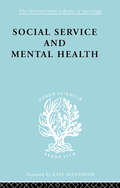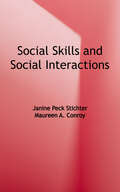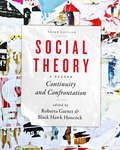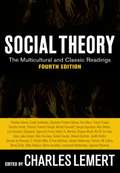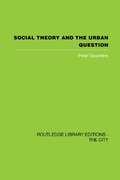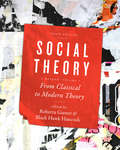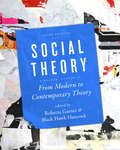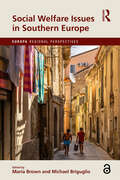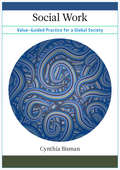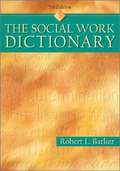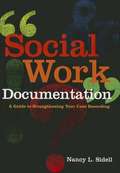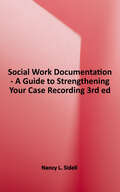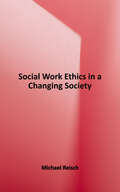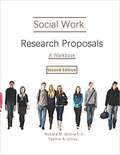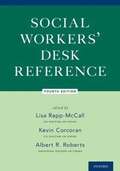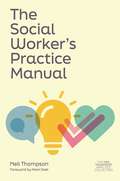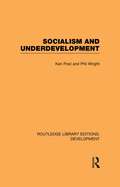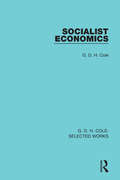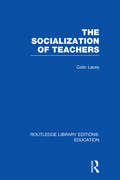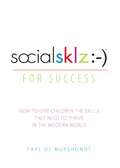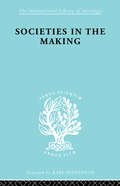- Table View
- List View
Social Service and Mental Health: An Essay on Psychiatric Social Workers (International Library of Sociology #Vol. 266)
by M. Ashdown S. Clement BrownFirst published in 1998. Routledge is an imprint of Taylor & Francis, an informa company.
Social Skills and Social Interactions
by Janine Peck Stichter Maureen A. ConroySocial Skills and Social Interactions is written to enhance the quality and quantity of social interactions of individuals with autism spectrum disorder (ASD) and their peers. The text describes social competence and peer-related social behaviors, a multisource functional approach to assessment, and evidence-based practices for fostering peer-related social interactions. This book provides a systematic process for educators to assess, plan for, and support students' social behaviors with peers in the classroom.
Social Theory: A Reader, Third Edition
by Black Hawk Hancock Roberta GarnerThe third edition of this popular reader reflects considerable changes. With over seventy readings representing a wide diversity of theorists, it offers a breadth of coverage not available in other collections. The framework for understanding theory as a set of conversations over time is maintained and deepened, with a focus on key transitional theorists who helped pave the way from classical to contemporary theory. New contextual and biographical materials surround the primary readings, and each chapter includes a study guide with key terms, discussion questions, and innovative classroom exercises. The result is a fresh and expansive take on social theory that foregrounds a plurality of perspectives and defines contemporary trends in the field, while being both an accessible and manageable teaching tool.
Social Theory
by Charles LemertThis first truly multicultural anthology collects important, readable texts representative of the full range of social theory from the nineteenth century to the present. Now that social theory is practiced in many disciplines, it is necessary to reflect on the variety of theories being read today and the earlier sources that are customarily neglected. If today we read Donna Haraway, Henry Louis Gates, and Michel Foucault, we should also read and understand Charlotte Perkins Gilman and W.E.B. Du Bois, alongside Max Weber, Georg Simmel, William James, and others from the end of the nineteenth century. This book, therefore, sets a wider gauge for the understanding of the history of social thought than could have been possible before. It brings together theories in unexpected and exciting ways: those of Talcott Parsons and Dorothy Smith, Robert K. Merton and Jacques Lacan, Immanuel Wallerstein and Frantz Fanon, James Coleman and Molefi Asante. Extensive introductory essays by the editor situate the readings in their historical place and time, identifying the currents of social change that shaped fundamental questions of modern and postmodern life. This fourth edition has been thoroughly revised and updated to include cutting-edge documents on teletechnologies, masculinities, rhizomes, bare life, and more.
Social Theory and the Urban Question
by Peter SaundersSocial Theory and the Urban Question offers a guide to, and a critical evaluation of key themes in contemporary urban social theory, as well as a re-examination of more traditional approaches in the light of recent developments and criticism. Dr Saunders discusses current theoretical positions in the context of the work of Marx, Weber and Durkheim. He suggests that later writers have often misunderstood or ignored the arguments of these 'founding fathers' of the urban question. Dr Saunders uses his final chapter to apply the lessons learned from a review of their work in order to develop a new framework for urban social and political analysis. This book was first published in 1981.
Social Theory, Volume I: From Classical to Modern Theory, Third Edition
by Black Hawk Hancock Roberta GarnerThe third edition of this popular reader reflects considerable changes. The framework for understanding theory as a set of conversations over time is maintained and deepened, pairing classical with contemporary readings to illustrate the ways in which theory continues to be reinterpreted over time. Volume I has been completely reorganized, with new contextual and biographical materials surrounding the primary readings, and end-of-chapter study guides that include key terms, discussion questions, and innovative classroom exercises. The result is a fresh and expansive take on social theory that foregrounds a plurality of perspectives and reflects contemporary trends in the field, while being an accessible and manageable teaching tool.
Social Theory, Volume II: From Modern to Contemporary Theory, Third Edition
by Black Hawk Hancock Roberta GarnerThe third edition of this popular reader reflects considerable changes. The framework for understanding theory as a set of conversations over time is maintained and deepened, but Volume II now begins with a focus on key transitional theorists who helped reconceive of classical theory in new ways. Extending from the classical tradition, chapters on race, gender, culture, media and globalization show how contemporary theory builds on the past even as it moves in new directions. New contextual and biographical materials surround the primary readings, and each chapter includes a study guide with key terms, discussion questions, and innovative classroom exercises. The result is a fresh and expansive take on social theory that foregrounds a plurality of perspectives and reflects contemporary trends in the field, while being an accessible and manageable teaching tool.
Social Welfare Issues in Southern Europe (Europa Regional Perspectives)
by Maria BrownThis volume is the first of its kind to discuss social welfare issues using case studies from a broad range of Southern European countries, both large and small, a decade after the financial crisis. It identifies similarities and differences in the ways in which Southern European countries engage with specific welfare issues and examines whether Southern European welfare is distinct from that of the rest of the continent. The book also engages with the impact of COVID-19 on the social welfare issues under investigation. The volume is divided into four sections, each examining in detail issues including employment, education, health, sexuality, globalization, social movements and migration. With its contributions from experts in the field, the volume is recommended for academics, researchers and students of sociology, social policy, economics, education, politics and social movements.
Social Welfare Issues in Southern Europe (Europa Regional Perspectives)
by Maria BrownThis volume is the first of its kind to discuss social welfare issues using case studies from a broad range of Southern European countries, both large and small, a decade after the financial crisis. It identifies similarities and differences in the ways in which Southern European countries engage with specific welfare issues and examines whether Southern European welfare is distinct from that of the rest of the continent. The book also engages with the impact of COVID-19 on the social welfare issues under investigation. The volume is divided into four sections, each examining in detail issues including employment, education, health, sexuality, globalization, social movements and migration.With its contributions from experts in the field, the volume is recommended for academics, researchers and students of sociology, social policy, economics, education, politics and social movements.
Social Work
by Cynthia BismanThis innovative textbook reconfigures generalist social work practice for the twenty-first century
The Social Work Dictionary (5th Edition)
by Robert L. BarkerProvides the social worker with an abbreviated interpretation of the words, concepts, organizations, historical events, and values that are relevant to the profession. Covers some 8,000 terms, including 2,000 that are new to this edition. Other features include a list of frequently-used acronyms; a list of milestones in the development of social work and social welfare; the NASW Code of Ethics; and resources. Annotation copyrighted by Book News, Inc., Portland, OR.
Social Work Documentation: A Guide to Strengthening Your Case Recording
by Nancy L. SidellIn Social Work Documentation: A Guide to Strengthening Your Case Recording, Nancy Sidell has written the perfect, practical, how-to book on developing effective documentation. Regardless of the practice setting, clinical specialty, and documentation format, this book will help to build better recording skills.
Social Work Documentation: A Guide to Strengthening Your Case Recording, 3rd Edition
by Nancy L. Sidell"Designed to help practitioners build writing skills in a variety of settings, Social Work Documentation is a how-to guide for social work students and practitioners interested in good record keeping and improving their documentation skills. This popular, must-have resource provides practical advice on current practice issues such as electronic case recording, trauma-informed documentation, and assessing and documenting client cultural differences of relevance. This third edition is updated to view documentation through person-first language, and includes a chapter on bias-free language selection, with examples and exercises to ensure appropriate wording choices are used related to age, disability, immigration and socioeconomic status, and gender and sexual orientation"--Provided by publisher.
Social Work Ethics in a Changing Society
by Michael ReischSocial Work Ethics in a Changing Society analyzes the challenges social workers face in applying social work values and ethics due to recent significant social, political, cultural, and technological changes. It provides readers with guidelines for ethical practice based on a philosophic foundation rooted in social justice principles. The book begins with a summary of key ethical concepts and principles. It then provides a brief history of social work ethics and analyzes their core assumptions in the context of new realities. The book provides readers with several frameworks through which to analyze a variety of contemporary ethical issues. In subsequent chapters, it applies these frameworks to situations largely derived from real-world experience. Global sources provide a comparative perspective on the interpretation and implementation of social work values and ethics. The book contains extensive case examples and reflection exercises that illustrate ethical dilemmas in all areas of practice and those created or complicated by increasing social and cultural diversity. It includes content on the application of ethics to policy practice through examples drawn from the 2010 Affordable Care Act, the nation's response to the coronavirus pandemic, and other current policy issues. Designed to help current and future social workers navigate a fractious, ever-evolving society, Social Work Ethics in a Changing Society is an excellent resource for students, faculty, and practitioners within the discipline.
Social Work Research Proposals
by Richard Grinnell Yvonne UnrauThis book describes how to do a social work research proposal on a step-by-step basis.
Social Workers' Desk Reference
by Lisa Rapp-McCall Al Roberts Kevin CorcoranPeople all over the world are confronted daily by issues such as poverty, a lack of access to quality education, unaffordable and or inadequate housing, and a lack of needed health and mental services. These issues are dynamic and varied, and social workers need to have access to relevant and timely evidence-based materials to meet the needs of those facing them. The Social Workers' Desk Reference is a comprehensive resource for practicing social workers. This essential reference is extraordinarily comprehensive and provides updated information in 15 parts covering the profession and its overarching themes; values, ethics, licensure; theoretical constructs; assessment; treatment plans; techniques; individual, family, and group Interventions; evidence-based practice; case management; community practice; vulnerable populations; behavioral and mental health; school social work; military social work; and forensic social work. All 163 chapters, written by experts in the field, are focused, practical, and contain critical content in addition to websites and updated references. The fourth edition follows in the tradition of the first three editions and updates previous topics but fearlessly addresses current salient subjects such as white nationalism, gaming disorder, substance abuse, LGBTQ+ populations, suicide, sexual violence in the military, smart decarceration, the legacy of racism, neurobiology, technology and social work practice, Islamophobia, pseudoscientific behavioral and mental health treatments, emerging fields of practice, and more. It has greatly expanded its section on vulnerable populations to address the wide variety of diversity in the U.S.
The Social Worker's Practice Manual (The Neil Thompson Practice Collection)
by Neil ThompsonAn essential handbook for students and experienced social workers alike, this practical guide filters out the jargon and sets out what you really need to know. 30 easy-to-follow chapters delve into topics ranging from holistic thinking to effective record keeping, all rooted in Neil Thompson's extensive hands-on experience. Complicated subjects such as cultural sensitivity and managing conflict are discussed thoughtfully and pragmatically, helping you understand the roots of tricky situations and find effective solutions. Each section successfully combines theory and practice to give a holistic view of social work that can be tailored to help each unique client. Over 45 years of experience distilled into one manual for success.
Socialism 101: From the Bolsheviks and Karl Marx to Universal Healthcare and the Democratic Socialists, Everything You Need to Know about Socialism (Adams 101)
by Kathleen SearsSocialism 101 is a comprehensive and accessible guide to the historical and modern applications of socialism.In today’s political climate, more and more presidential candidates are espousing socialist—or democratic socialist—policies. Once associated with oppression, socialism is now a current topic of conversation with everyday Americans, including policies like taxing the rich and healthcare for all. But what exactly is socialism and why does it spark such an intense debate? Socialism 101 provides an easy-to-understand, unbiased overview to the nearly 300-year-old origins of this mode of government, its complex history, basic constructs, modern-day interpretations, key figures in its development, and up-to-date concepts and policies in today’s world. As capitalism has become less appealing and socialism experiences a surge in popularity, the need for clarification of what it means has never been more necessary than now.
Socialism and Underdevelopment (Routledge Library Editions: Development)
by Ken Post Philip WrightIn this book, first published in 1989, Ken Post and Phil Wright provide a critical analysis of socialist construction in underdeveloped countries. Pointing out that all the socialist revolutions of the twentieth century have occurred in underdeveloped peripheral capitalist countries, they focus on the relationship between socialism and underdevelopment. They bring together the insights of both development theory and the political economy of socialism, and draw upon their direct experience of the state socialist societies as diverse as North Korea, Yugoslavia, Vietnam, and the Soviet Union.
Socialist Economics (Routledge Library Editions)
by G. D. ColeThis volume sets forth as simply as possible the theoretical foundations which underlie the practical policies of democratic Socialism. This involves both a repudiation and a refutation of the assumptions of the older classical economists who believed in laissez-faire, and a careful differentiation of the economics of democratic Socialism from the neo-classical doctrines associated with the name of Maynard Keynes.
Socialization
by Kim Campbell Thornton Buck JonesAs author Kim Campbell Thornton begins this Simple Solutions guide, "Dogs are known as man's best friend, but they don't come ready-made to take on this role." Socialization unlocks the key to the human-dog bond and explains how well-mannered, well-adjusted dogs are made (not born). A term used by canine behaviorists and trainers, socialization is a fancy five-syllable word for "getting friendly," which doesn't come naturally to all dogs. This handy little book begins with a discussion of puppy life stages, showing how puppies developmentally mature and what their ever-changing needs are. New puppy buyers must be aware of the importance of the breeder's role in socializing a litter of puppies, a critical process of introducing each pup to people, other dogs, and common everyday noises, during its critical developmental stages. Puppies raised without socialization (typically in a commercial breeding establishment, sometimes called a puppy mill) have a decided disadvantage and may never develop into normal, well-adjusted dogs. The book gives the new dog owner advice about planning social outings for the puppy so that he has "People to Meet, Places to Go," ever expanding his social graces and comfort level with strangers and the not-so-scary-after-all unknown. The author also provides excellent guidance on introducing a dog to a new baby as well as introducing an adopted dog into an established multipet household.
The Socialization of Teachers (Routledge Library Editions: Education)
by Colin LaceyThe change from a student role to a teacher role can be one of the most abrupt and stressful transitions in working life but the process of socialization does not end when the student becomes a fully qualified teacher, as many writers, laymen and sociologists, would have us believe. Colin Lacey argues that socialization is a partial and rarely homogenous process. He illustrates this from a wide variety of interesting case material to show how student teachers adapt their responses to the classroom situation.
socialsklz: How to Give Children the Skills They Need to Thrive in the Modern World
by Faye De MuyshondtWith the world of technology advancing and face-to-face communication becoming less common, it is no wonder the many "manner” and "etiquette” books fall short of reaching young people who are fully enveloped in a digital age. Faye de Muyshondt’s socialsklz:-) for success is not only relevant, touching on topics of email, social networking, cyberbullying, and smartphones, but also breathes life into the basics: how to speak, shake hands, make conversation, and behave in all social settings. Although they are not typically taught in school, research has shown that teaching these skills increases academic scores. The book takes de Muyshondt’s highly successful NYC workshop and brings it to the homes of millions in this fun and interactive guidebook designed to direct parents in teaching kids the skills necessary for success without being perceived as a "nag. "
Societal Stress and Law
by Larry D. BarnettSocietal Stress and Law draws attention to the social side effects of law by developing the sociological concept of society-level stress, a corollary of the concept of individual-level stress in the biological sciences. To encourage interest in societal stress, the book looks at (1) instances of law adopted by American states that the U.S. Supreme Court held unconstitutional and (2) actions by American states with regard to a proposal to amend the federal Constitution. The Court rulings and the proposed constitutional amendment were capable of producing societal stress because they were seen by a sizeable segment of the U.S. public as being incompatible with significant American traditions. In original studies that apply logistic regression to state-level statistical data, the book identifies sociological variables that predict state differences in the adoption of this law and state differences in actions on the proposed constitutional amendment. Because these variables represent societal agents that affected whether a state experienced social stress from the rulings and proposal, the book blends theory with empirical research and illustrates how each can support the other in law-focused scholarship.
Societies In Making Ils 89 (International Library of Sociology)
by Hilda JenningsPublished in 1998, Societies In Making IIs 89 is a valuable contribution to the field of Sociology & Social Policy.
